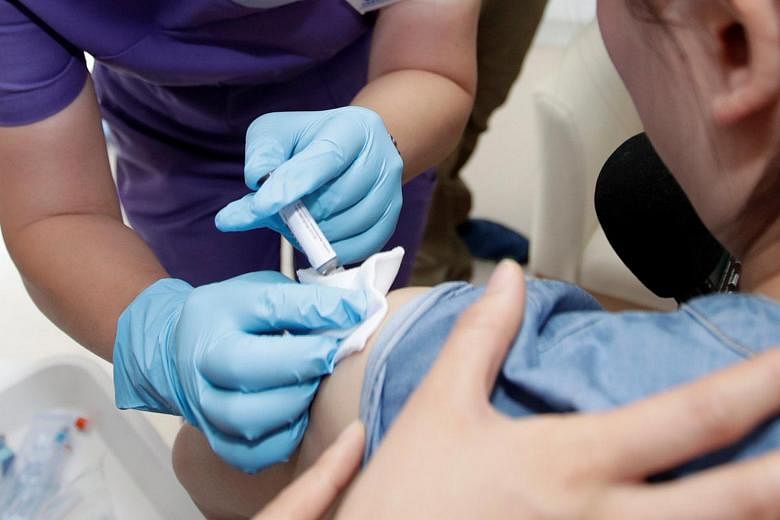HONG KONG (BLOOMBERG) - Medical tourism has been a great business for Manna Wang, an insurance agent in Shenzhen who's been helping Chinese women travel to Hong Kong for a vaccine against the human papillomavirus, or HPV, which can cause cervical cancer.
Business has been so good, in fact, that the medicine is running is out.
In the two years since Merck & Co's Gardasil 9 became available in Hong Kong, about 2 million mainlanders have come for the shots, according to Xinhua news agency.
With the drugmaker unable to keep up, some clinics are turning away Chinese patients, and angry mainlanders have protested at Merck's local office.
The cost of the vaccine has more than tripled to HK$8,000 (S$1,360) and complaints have flooded the city's consumer protection agency.
"The vaccine price is crazy," said Wang, who last month stopped booking reservations for mainland women seeking the drug. "It's a good vaccine, just not worth that price."
The supply crunch is just the latest example of how the sheer scale of Chinese demand has the power to disrupt life in Hong Kong. In 2013, a buying spree by mainlanders caused shortages of baby formula at city stores.
The year before that, there were shortages of hospital beds because so many Chinese women were coming to the city to give birth.
"Hong Kong will always get hit by unexpected demand from Chinese consumers," said Fielding Chen, a Bloomberg economist in Hong Kong. "It's always difficult to forecast."
The events that led to Hong Kong's vaccine scramble began last summer when Merck was the victim of a cyber attack that disrupted production of Gardasil 9, which is the top-of-the-line HPV vaccine because it offers the broadest range of protection.
The city isn't the only place in the region where supplies are tight. Some clinics in New Zealand and Singapore have also reported shortages.
UNINTENDED CONSEQUENCES
But Hong Kong's supply squeeze has been worsened by increased demand from China, where cervical cancer killed 30,000 women in 2015.
Starting the next year, mainland regulators began approving several older and less efficacious versions of the vaccine by Merck and GlaxoSmithKline.
The moves raised awareness about the risks of the human papillomavirus and had the unintended effect of sending women in search of Gardasil 9, which was available in neighbouring Hong Kong.
Things came to a head in April, when a surge in requests for appointments forced the government-supported Family Planning Association of Hong Kong to announce it would no longer give the shots to people who weren't local residents.
"We just couldn't handle all the phone calls and incoming emails," said Michelle Chak, press officer at the association.
Gardasil 9 requires three injections over 12 months. Numerous private clinics say they have run out of vaccine, leaving some patients unable to complete the regime.
That's led to an increase in complaints to Hong Kong's Consumer Council, which received over 400 vaccine-related claims in the first four and a half months of the year, compared with 478 for all of 2017.
A confrontation on June 6 between a group of about 10 mainlanders and staff at a Kowloon clinic turned violent, according to Apple Daily and other local media, with several people reported injured.
For women concerned about getting their Gardasil 9 shots, there's no relief in sight.
Merck, known as MSD outside North America, expects supply constraints to continue "throughout the coming year," the company said in an emailed statement. The drugmaker said it had called on city clinics to stop vaccinating new patients.
Those calls come as the drug maker builds its HPV business in the mainland. Gardasil 9 was approved by China's regulators in April and last month a hospital in Hainan Province's city of Boao became the vaccine's first mainland provider, charging 5,800 yuan (S$1,212) for the three shots.
NEW MARKET
"To support a limited launch in Hainan province, a small amount of Gardasil 9 doses from our existing global manufacturing network was provided to China," Merck said in a statement.
On a May 1 call with analysts, Merck's president of global human health Adam Schechter was asked whether sales in China could double HPV vaccine revenue, which last year totaled US$2.3 billion.
"We're off to a very strong start," Schechter said. "But we're going to have to really wait to see a period of time to understand if that demand will continue."
Eventually the availability of Gardasil 9 in the mainland should ease pressure on Hong Kong's clinics, but the city government is warning not to expect a quick return to normal.
The Department of Health "will continue to request MSD to increase the import quantity of the vaccine to meet the needs of the local private health-care market," a spokesman said in a statement.
Across the border in Shenzhen, vaccine tourism agent Wang hasn't given up hope that the business will recover.
"I've suggested my clients wait for a few months till the fervour fades," she said.

